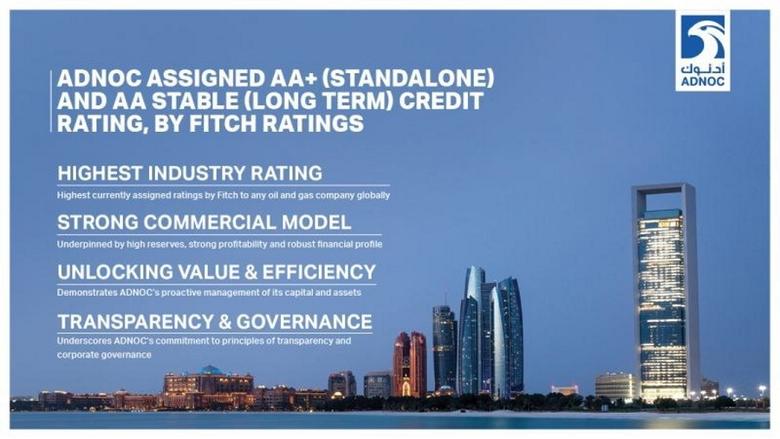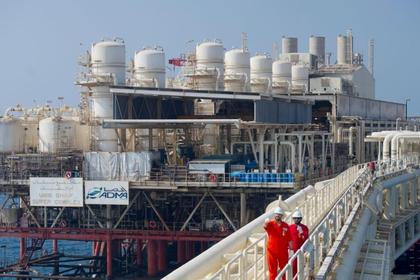
ADNOC RATING 'AA'

FITCH RATINGS- 17 Dec 2020 - Fitch Ratings has affirmed Abu Dhabi National Oil Company's (ADNOC) Long-Term Issuer Default Rating (IDR) at 'AA' with a Stable Outlook.
The rating of ADNOC is constrained by that of its 100% shareholder Abu Dhabi (AA/Stable), given strong links between the company and the sovereign, in line with Fitch's Government-Related Entities (GRE) Rating Criteria and Parent and Subsidiary Linkage (PSL) Rating Criteria. ADNOC is the national oil company of the Emirate of Abu Dhabi and is one of the largest oil producers globally.
We assess ADNOC's standalone credit profile (SCP) at 'aa+', which reflects (i) the company's high upstream production and vast oil reserves (ii) very low cost of production (iii) integration into downstream operations (iv) very conservative financial policies, high financial flexibility and low leverage, and (v) strong unit profitability comparable to that of global oil majors.
The upstream operations of ADNOC are focused on a single country and its production infrastructure is somewhat concentrated, which is mitigated by its available spare capacity and access to storage facilities.
KEY RATING DRIVERS
Response to Coronavirus Crisis: The UAE have agreed with other OPEC+ countries to make significant production cuts in 2020-2022 to re-balance the market. We estimate UAE's oil production to fall around 10% yoy in 2020 before rebounding gradually in 2021-2022 but ADNOC will benefit from stabilised oil prices. ADNOC has revised down its 2020 capex by 35% from its original plan, though it will remain broadly at the 2019 level, unlike that of most other oil and gas producers globally.
Ambitious Capex Programme: ADNOC's capex is set to increase in line with the ambitious five-year USD122 billion spending plan for 2021-2025 approved in November 2020 by the Supreme Petroleum Council. ADNOC will cover the majority of the capex with the rest being covered by partners. Abu Dhabi's ambitions include expanding the upstream production capacity to 5 million barrels per day (mmbpd) by end-2030 from 4mmbpd by end-2020, increasing natural gas production, and increasing its downstream capacity and complexity.
Low Cost, but Higher Oil Exposure: ADNOC's low lifting costs, low maintenance capex and ability to manage production are a significant advantage in the volatile oil price environment. However, it is more exposed to energy transition risks than oil majors, particularly in Europe, which are more integrated into natural gas and have publicly committed to gradually increase investments in renewables. Fitch's base case is that the energy transition will not have a significant impact on the supply-demand balance in the market for at least the next five years, but over the longer term it could start to affect credit quality of some issuers in the industry.
Potential Renewables Investments: ADNOC is considering investments into hydrogen and other alternative fuels and technologies, such as carbon capture, utilisation and storage, in order to cut its carbon intensity. Over time, these potential initiatives could mitigate the energy transition risk.
Conservative Financial Profile: ADNOC's financial profile is very conservative. We calculate the company's funds from operations (FFO) net leverage at less than 0.1x at end-2019, and we forecast this will not exceed 0.5x over the next four years. We also assume that ADNOC will continue to fund capex largely from its operating cash flows, and its dividends will continue to be based on excess cash generated during the year adjusted for capital investments and debt movements.
Sovereign Constrains Rating: ADNOC's rating is constrained by that of Abu Dhabi in accordance with Fitch's both GRE and PSL Rating Criteria. This reflects the influence the state exerts on the company through strategic direction, taxation and dividends, as well as regulating the level of production in line with OPEC commitments. ADNOC's 'aa+' SCP is contingent on the company's ability to maintain net leverage below 1x through the cycle.
Strong Linkage: We assess status, ownership and control as well as socio-political impact of default as 'Very Strong' given that ADNOC is fully owned by Abu Dhabi and that the company is a major employer in the country and the major contributor to the state budget.
We assess support, track record and expectations, as well as financial implications of a GRE default as 'Strong'. ANDOC's robust financial position historically has not necessitated support from the government, but we expect that support would be forthcoming if the need arises. While the company is not active in the bond capital market at group level, Fitch expects a default would negatively affect Abu Dhabi's and other GREs' ability to access capital markets.
Strong Profitability: ADNOC's profitability is in line with that of international oil majors and exceeds that of some national oil companies, in view of the company's low production costs, oil-heavy production profile and competitive tax regime. We estimate that ADNOC's FFO per barrel of oil produced in 2019 amounted to USD37/boe, broadly comparable with that of Total SE (USD30/boe) and Royal Dutch Shell plc (Shell; USD32/boe), and higher than that of Saudi Arabian Oil Company (Saudi Aramco; USD22/boe) and Russia's PJSC Lukoil (USD20/boe).
Strategic Partnerships: ADNOC is pursuing a strategy of bringing in minority partners to its operating companies to attract funding, improve access to overseas markets and share know-how. In 2020, ADNOC raised USD15.9 billion through a series of transactions, following USD10.6 billion raised in 2019.
Minority Dividends Deducted from FFO: ADNOC sold minority interests in several asset companies, which hold the usage rights in ADNOC's oil and gas pipelines and some real-estate assets. The transactions will result in ADNOC paying dividends to minority investors, which will be funded by tariff fees or lease payments. Fitch views these minority dividends as akin to lease payments, but does not capitalise them in line with our lease treatment and also due to the non-core nature of these assets. Instead, we deduct such distributions to minority shareholders from FFO. For 2021, we project such outflows to be less than 3% of ADNOC's projected FFO.
Even if Fitch were to treat the proceeds from such transactions as debt-like obligations, ADNOC's FFO net leverage in 2020-2023 would still be within the range of 1.0x which we believe is commeasure with the 'aa+' SCP.
DERIVATION SUMMARY
ADNOC is the state-owned oil company of the Emirate of Abu Dhabi and is one of the world's largest oil producers by volume. Its 2019 Fitch-calculated net consolidated upstream production, including condensate, averaged 3.2 million barrels of oil equivalent per day (mmboepd), comparable to the upstream output of global integrated companies, such as Shell (AA-/Stable, 3.4mmboepd, excluding equity affiliates), Total (AA-/Stable, 2.3mmboepd), and BP plc (A/Stable, 2.5mmboepd). According to the BP Statistical Review of World Energy, UAE's reserve life amounted to 67 years in 2019, a very high level by international standards.
ADNOC's (AA/Stable) SCP of 'aa+' is similar to that of Saudi Aramco (A/Negative; SCP: aa+). ADNOC's SCP considers its high production, significant reserves, low productions costs, downstream integration and a very conservative financial profile relative to peers'. The SCP also incorporates the risks inherent in the oil and gas business, such as price volatility and cyclicality, as well as ADNOC's fairly low level of integration into natural gas.
ADNOC's ratings are constrained by those of Abu Dhabi due to our assessment of strong linkage between the company and the emirate.
KEY ASSUMPTIONS
- Brent crude prices: USD41/bbl in 2020, USD45/bbl in 2021, USD50/bbl in 2022 and USD53/bbl thereafter
- Upstream output falling around 10% yoy in 2020, broadly stable in 2021-2022 and increasing thereafter
- Annual capex as guided by the company
- Excess cash generated during the year is paid out in dividends
RATING SENSITIVITIES
Rating sensitivities for ADNOC
Factors that could, individually or collectively, lead to positive rating action/upgrade:
- Positive rating action on Abu Dhabi
- An upward revision of the SCP is unlikely given inherent volatility of the oil and gas industry and ADNOC's upstream production concentration in a single country
Factors that could, individually or collectively, lead to negative rating action/downgrade:
- Negative rating action on Abu Dhabi
- Weakening of the linkage between Abu Dhabi and the sovereign (which we believe is unlikely), coupled with significant deterioration of ADNOC's SCP
- FFO net leverage rising to above 1x on a sustained basis due to, for example, sustainably negative FCF or large acquisitions, which may be negative for the SCP but not necessarily for the IDR
- Accelerated energy transition leading to lower global oil demand
Rating sensitivities for Abu Dhabi (see "Fitch Affirms Abu Dhabi at 'AA'; Outlook Stable" dated 29 October 2020)
The main factors that could, individually or collectively, lead to positive rating action/upgrade:
- Structural features: Improvement in structural factors such as reduction in oil dependence, a strengthening in governance, the business environment and the economic policy framework, while maintaining strong fiscal and external balance sheets.
The main factors that could, individually or collectively, lead to negative rating action/downgrade:
- Public Finances: Substantial erosion of fiscal and external positions, for example due to a sustained period of low oil prices, or a materialisation of contingent liabilities.
- Structural Features: A geopolitical shock that impacts economic, social or political stability.
BEST/WORST CASE RATING SCENARIO
International scale credit ratings of Non-Financial Corporate issuers have a best-case rating upgrade scenario (defined as the 99th percentile of rating transitions, measured in a positive direction) of three notches over a three-year rating horizon; and a worst-case rating downgrade scenario (defined as the 99th percentile of rating transitions, measured in a negative direction) of four notches over three years. The complete span of best- and worst-case scenario credit ratings for all rating categories ranges from 'AAA' to 'D'. Best- and worst-case scenario credit ratings are based on historical performance. For more information about the methodology used to determine sector-specific best- and worst-case scenario credit ratings, visit https://www.fitchratings.com/site/re/10111579.
LIQUIDITY AND DEBT STRUCTURE
As at 30 September 2020 ADNOC's cash and cash equivalents comfortably covered the company's short -term debt. Our liquidity assessment also incorporates its substantial cash flow generation capacity, flexible dividend policy, low debt levels and a balanced debt-maturity profile.
REFERENCES FOR SUBSTANTIALLY MATERIAL SOURCE CITED AS KEY DRIVER OF RATING
The principal sources of information used in the analysis are described in the Applicable Criteria.
PUBLIC RATINGS WITH CREDIT LINKAGE TO OTHER RATINGS
ADNOC's rating is constrained by that of Abu Dhabi.
-----
Earlier:












